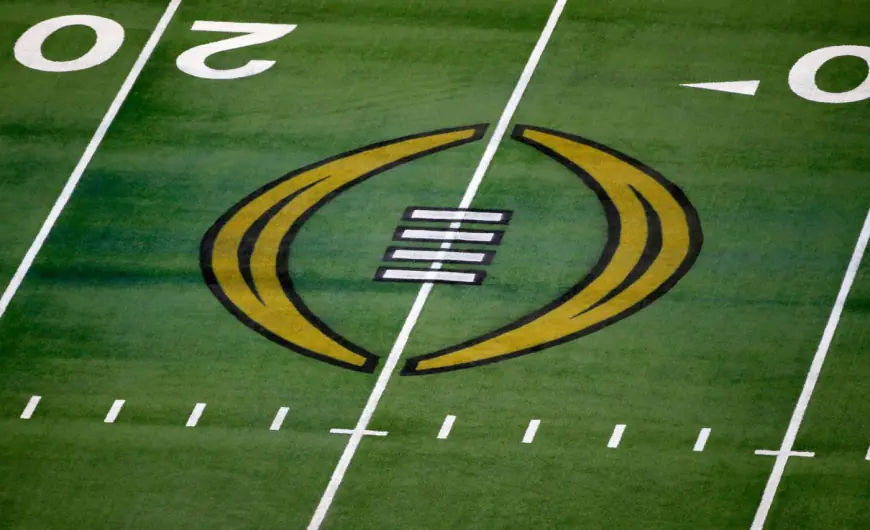The Hot 25 rankings: Our look at most influential people in college football
Welcome to the second annual Hot 25 rankings — the Hotline’s look at the 25 most influential people in college football, with a twist: These are the key movers behind the scenes. We have excluded coaches, athletic directors, conference commissioners, NCAA executives and media personalities. Did we miss someone? Probably. The intent of the exercise […]

Welcome to the second annual Hot 25 rankings — the Hotline’s look at the 25 most influential people in college football, with a twist: These are the key movers behind the scenes.
We have excluded coaches, athletic directors, conference commissioners, NCAA executives and media personalities.
Did we miss someone? Probably.
The intent of the exercise is to illuminate the sport’s complicated, layered machinery and identify the people who shape the terrain.
Comments? Suggestions? Searing criticism? Hit me via the email address listed below.
Here we go.
1. Jeffrey Kessler (co-executive chairman at Winston & Strawn) and Steve Berman managing partner Hagens Berman)
The plaintiffs’ lead attorneys in the groundbreaking House vs NCAA antitrust lawsuit were an easy call for the top spot after creating the era of revenue sharing across major college sports. The settlement forged with the power conferences last spring must be approved by Judge Claudia Wilken in April (and will face legal challenges). But regardless of final form, there will be no going backward from the case filed by former Arizona State swimmer Grant House. The schools will have to share millions with the athletes each year.
2. Paul Cairns (EA Sports chief business officer) and Daryl Holt (EA Sports senior vice president)
Few events in 2024 generated more attention than the return of EA Sports’ celebrated College Football video game franchise after a decade-long shutdown due to the O’Bannon antitrust case. The hype was justified: College Football 25 was the top-selling video game of 2024 and became the best-selling sports video game ever. Cairns and Holt played essential roles and, for the purposes of this exercise, are representing everyone involved in the endeavor.
3. Jimmy Sexton (Creative Artists Agency co-head of football)
The most powerful agent in college sports had a decent 12 months, which began with the retirement of one client, Alabama’s Nick Saban, and featured hefty pay raises for several others, including Texas’ Steve Sarkisian, Florida State’s Mike Norvell and Washington’s Kalen DeBoer, who became Saban’s replacement in Tuscaloosa. Oh, and Sexton also represents Georgia’s Kirby Smart, Oregon’s Dan Lanning, Penn State’s James Franklin and Mississippi’s Lane Kiffin — just to name eight.
4. Burke Magnus (ESPN’s president, content)
Technically, the org chart in Bristol starts with chairman Jimmy Pitaro. But Magnus has been the network’s prime mover on college sports (strategic decisions and media rights deals) for years. And as we’re reminded on a near-daily basis across an NCAA competition calendar that runs from late August into June, ESPN runs college sports.
5. Mark Silverman (Fox Sports president) and Jordan Bazant (Fox Sports executive vice president)
Fox cannot match the sweep of ESPN’s game inventory — and it doesn’t want to — but the network has a momentous influence on college football nonetheless. In addition to the broadcasts on Fox and FS1, the company owns a majority stake of the Big Ten Network. (In other words, it controls the Big Ten’s media rights.) We should note Bazant’s cross-sports influence overseeing development of the College Basketball Crown, a new postseason event that could, eventually, become a foil to the NCAA Tournament.
6. Linda Livingstone (Baylor president)
Few university presidents or chancellors understand college sports as well as Livingstone, who is the chair of both the NCAA Board of Governors and the Big 12 board of directors. She’s at the center of the ongoing effort to preserve the foundation of higher education within a multi-billion-dollar industry becoming ever more professionalized. We wish her the best in that fight.
7. John Preston Bailey (District Judge, Northern District of West Virginia)
Bailey issued the momentous restraining order in late 2023 that gave second- and third-time transfers the ability to compete without establishing a year of residence. The ruling led to a settlement between the NCAA and a collection of state attorneys general, in the spring of 2024, that created the era of immediate eligibility no matter how many times an athlete transfers.
8. Alan Gold (CAA Evolution head of media), Dan Cappetta (CAA Evolution vice president) and Dean Jordan (Wasserman Media Group managing executive)
The powerhouse consultants — Gold and Jordan, in particular, have been involved in transformative college sports media deals over the years — teamed up to negotiate the College Football Playoff’s new contract with ESPN, which is reportedly worth $7.8 billion over six years (starting with the 2026 season). The agreement provides the foundation for the CFP’s new revenue distribution model that will spin off roughly $20 million to each school in the SEC and Big Ten and $13 million to each member of the Big 12 and ACC.
9. Len Perna (TurnkeyZRG chair) and Chad Chatlos (TurnkeyZRG managing director for athletics)
Turnkey has emerged as the industry’s dominant executive placement firm, leading the process to identify several Power Four commissioners and even NCAA president Charlie Baker. Additionally, Chatlos runs point on numerous searches for athletic directors and head coaches, recently helping Wake Forest land Jake Dickert (to cite one example). Perna is a key player behind one of the college football super-league concepts, although those have yet to gain traction.
10. Dan Rascher (SportsEconomics founder and OSKR partner)
The University of San Francisco sports management professor has provided testimony in NCAA legal cases for years. Most recently, he was the plaintiffs’ expert witness in the House lawsuit expected to result in billions of dollars being shared with athletes through the damages and injunctive portions of the settlement.
11. AJ Maestas (Navigate founder) and Jeff Nelson (Navigate president)
The valuation and analytics company has a long list of clients at both the conference and campus levels. In 2024, Navigate took a leading role in the industry’s major realignment move: The Pac-12’s decision to add five schools from the Mountain West and Gonzaga. (That process is not complete — the conference needs one more full-time member — and Navigate remains heavily involved.)
12. Karen Brodkin (WME co-head of sports) and Hillary Mandel (IMG Media executive vice president)
Brodkin and Mandel work as a team and have advised conferences on major deals and realignment decisions in recent years, including the Big 12. They are currently leading the Mountain West’s membership restructuring and media negotiations.
13. Brett Goetz (South Florida Express founder)
Goetz is one of the most influential figures in recruiting, overseeing a 7-on-7 program that produced Geno Smith, Amari Cooper, Devin Bush, Asante Samuel Jr., and numerous other college stars. But for our purposes, the present matters most. And the Express delivered three members of Ohio State’s receiving corps, including Jeremiah Smith.
14. Mark Keenum (Mississippi State president)
As chair of the College Football Playoff’s board of managers, Keenum is ultimately responsible for all the major CFP decisions. In the past year, the list of action items includes approving the new media contract with ESPN and the revamped revenue model that will treat the SEC and Big Ten differently from everyone else.
15. Walker Jones (Collective Association vice chair, Grove Collective executive director)
Jones, a former Mississippi linebacker and sports agent, serves as president of the university’s name, image and likeness initiative, the Grove Collective. But he has become a leading national voice in the NIL world, as well. The Collective Association advocates for athletes and collectives alike, including groups affiliated with Michigan, Oregon and Washington.
16. Dave Brown (Gridiron founder and president)
The former ESPN executive runs the dominant scheduling service in major college football. Gridiron essentially plays matchmakers for teams in need of non-conference games. Brown also provides strategic advice to teams and conferences in the intricate world of scheduling.
17. Dennis Miller (The CW president)
Miller stepped down late in 2024, but not before he led a two-year push that gave The CW a piece of the ACC’s media package (through a sub-licensing deal) and the exclusive agreement with the Pac-12 in 2024. Don’t discount the possibility of The CW becoming a major player in the college sports media space in years to come. It might grab a piece of the Pac-12 rights starting in 2026, in fact.
18. Casey Schwab (Altius founder) and Tommy Gray (Altius CEO)
Altius is known for assisting athletic departments with their NIL operations but has expanded its role recently, consulting on revenue generation endeavors and expenses management. (If you haven’t been paying close attention, the schools need a lot of help with their expense management.) Schwab stepped away from leading the company on a daily basis last summer, handing off duties to Gray.
19. Patti Phillips (Women Leaders in Sports CEO)
An industry dominated by men would be even more out of balance on the gender front if not for Phillips and her association’s work over the years. That role could be magnified in coming months as the industry debates and (possibly) resolves how Title IX impacts the House settlement and the future of Olympics sports.
20. Jack Swarbrick (consultant)
The former Notre Dame athletic director’s fingerprints are all over the sport: Swarbrick hired Irish coach Marcus Freeman and was one of the four architects of the new CFP format, which created a pathway for Notre Dame to remain Independent while competing for the national title. His work as all-around consigliere over the past few months has been noteworthy: Swarbrick is one of the power players, along with former Disney executives, behind the Project Rudy super-league concept.
21. Gerry Cardinale (RedBird Capital founder)
In the college sports space, Cardinale is best known as the founder of Collegiate Athletic Solutions, which is poised to provide tens of millions of dollars to athletic departments when — not if — they take the plunge into private capital. of note: Cardinale partnered with Weatherford Capital on the CAS venture.
22. Carrie Cecil (CEO of ANACHEL)
Cecil is a crisis communications specialist in an industry inundated with crises, working with coaches, athletic directors, university presidents, conference commissioners and bowl games alike on issues across the legal and legislative spectrum.
23. Ramogi Huma (National College Players Association executive director)
The former UCLA linebacker has been a leading advocate for players rights for years and helped spark the name, image and likeness revolution. His group opposes the House settlement because of the caps it places on revenue sharing and roster limits.
24. Cole Gahagan (Learfield CEO)
Learfield might be best known to fans as the lead sponsor of the Directors’ Cup rankings of the most successful athletic departments. But it plays a key role behind the scenes as a multimedia rights dynamo (e.g., local radio deals and sponsorships) and counts Alabama, Georgia, Michigan, Ohio State and Texas among its hundreds of clients.
25. Claudia Wilken (Senior District Judge, Northern District of California)
Wilken previously handled Ed O’Bannon’s landmark case that sparked the NIL era. In October, she granted preliminary approval to the House vs NCAA settlement. But the big day is April 7, when Wilken will oversee a final approval hearing. Put another way: She could very well be No. 1 in next year’s Hot 25 rankings.
Also considered: Trace Armstrong (sports agent), Jason Belzer (Student Athlete NIL founder), Nick Carparelli (Bowl Season executive director), Rich Clark (College Football Playoff executive director), Brian Davis (California Power Athletes founder), Clint Dowdle (sports agent), Jay Ezelle (antitrust attorney), Dan Margulis (ESPN senior director), Matt Kelly (contract attorney), Mike Locksley (National Coalition of Minority Football Coaches founder/Maryland head coach), Daniel Parker (search firm executive), Matt Roberts (D1.ticker founder), Drew Weatherford (private equity investor)
*** Send suggestions, comments and tips (confidentiality guaranteed) to wilnerhotline@bayareanewsgroup.com or call 408-920-5716
*** Follow me on the social media platform X: @WilnerHotline
What's Your Reaction?









































































































